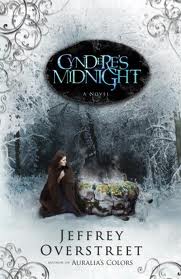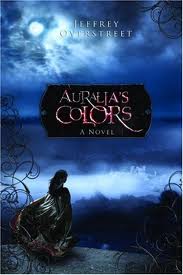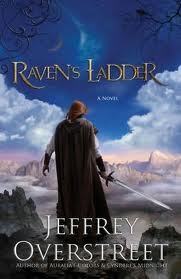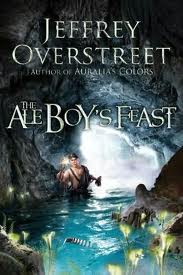The Auralia Thread: Reflections on A Vast Expanse
I joined the Christian Science Fiction and Fantasy Blog Tour, run by our own fabulous Becky Miller, all the way back in January 2009.
 I missed my chance to read the first book, and the second book–Jeffrey Overstreet’s Cyndere’s Midnight–had already been sent out to reviewers. But I was intrigued enough by the story and excited enough about the tour that I went out and bought both Cyndere’s Midnight and its prequel, Auralia’s Colors, launching into a love affair with the modern-day series that has done more than anything else to renew my interest in speculative fiction.
I missed my chance to read the first book, and the second book–Jeffrey Overstreet’s Cyndere’s Midnight–had already been sent out to reviewers. But I was intrigued enough by the story and excited enough about the tour that I went out and bought both Cyndere’s Midnight and its prequel, Auralia’s Colors, launching into a love affair with the modern-day series that has done more than anything else to renew my interest in speculative fiction.
 The Auralia Thread, which also includes Raven’s Ladder, finished this month with the release of The Ale Boy’s Feast. As I reread Raven’s Ladder in preparation to finish the series, it’s struck me that the richness of these stories stems in part from the author’s refusal to tie everything down to one allegory or one story or even one character. The world of the series is appropriately called The Expanse; the story is sprawling.
The Auralia Thread, which also includes Raven’s Ladder, finished this month with the release of The Ale Boy’s Feast. As I reread Raven’s Ladder in preparation to finish the series, it’s struck me that the richness of these stories stems in part from the author’s refusal to tie everything down to one allegory or one story or even one character. The world of the series is appropriately called The Expanse; the story is sprawling.
Last time I wrote in any depth about The Auralia Thread, it was to comment on the incredible picture of depravity and redemption in two of the characters–a beastman becoming a man and a man becoming a beastman. But as I’m reading again I’m struck this time by other themes. The way we treat the elderly and the weak. The way stories grow and reflect truth–or lies. The relationships between charismatic, visionary people and their best friends. (As someone who grew up in a house of charismatic, visionary people, this one really stands out to me.) Whether it’s okay to swear in our fiction (yes, this actually does come into the story). The terrible risks of self-absorption and the heavy, beautiful weight of caring.
 And the dangers of thinking that just because we’ve glimpsed a mystery, we understand it.
And the dangers of thinking that just because we’ve glimpsed a mystery, we understand it.
Some readers have expressed frustration with this series because of its lack of a clear message, a clear allegorical representation of God, a clear representation of Christianity. Yet there’s irony in that, because the story itself explores what happens when we sit back and look at life from a new perspective and let it speak to us without trying to force a message into place. It does so through glimpses of people, of their struggles, of their beliefs, and of their transformations. And it does so through the skillful, beautiful poetry of language.
If anything, this is a series that has inspired me to think bigger about writing–and about life. It challenges me to look at even the smallest parts of human existence as worthy of exploring, as worthy of poking at to see what meaning might come out. It reminds me that life is a vast expanse, and writing will be most enthralling when it goes to the farthest edges, highest heights, and tiniest hiding places to see what’s there.
I know that a book has been well worth reading when I come away from it and start seeing my own life differently. This series has had that effect for me.
 If this post reads like an introduction, that’s because it is. I’m hoping to interview Jeffrey Overstreet in this space before long (you can read a past interview here and here), and also to give away at least one copy of The Ale Boy’s Feast. If you haven’t encountered these books yet, I encourage you to check them out.
If this post reads like an introduction, that’s because it is. I’m hoping to interview Jeffrey Overstreet in this space before long (you can read a past interview here and here), and also to give away at least one copy of The Ale Boy’s Feast. If you haven’t encountered these books yet, I encourage you to check them out.
But more than that, I encourage you to look around at your life’s vast expanse and see what stories are hiding at the edges.










































I’ve been waiting for the series to end before reading it. Most 0f the reviews are very positive and your over-all comments add a motivating factor for me to start it soon. Most of those that didn’t care for it didn’t read all the books starting at the beginning so my guess is it’s more of a quadrilogy then a series. Thanks
Steve, “quadrilogy” is a very good word for it. As you may have picked up, I’m rereading the third book before I start the fourth and final–it’s been a year since I read it last, and I KNOW I will get lost if I dive right into the end without a refresher.
But the series is now officially over, so you can get started anytime!
I loved the series. It’s nice to find a fantasy series that combines imagination with a high level of literary prose, and Jeffrey Overstreet does both very well.
I work in a bookstore, so I’ve looked at this series several times in browsing all the fiction that’s out there. It’s caught my attention and I’ve read some great reviews on it. Now that the series is finished and I’ve read your take on it, I think it may finally find it’s way on to my reading list. Thanks for the review!
I love this series too–absolutely amazing, and your review is right on.
I LOVE these books too. Rachel, you did a terrific job of explaining their complexity and wonder. Can’t wait to read The Ale Boy or whatever it is. Unfortunately I lent the first book to someone who lost it, so … I’m sad. Can’t re read the whole thing.
Phyllis